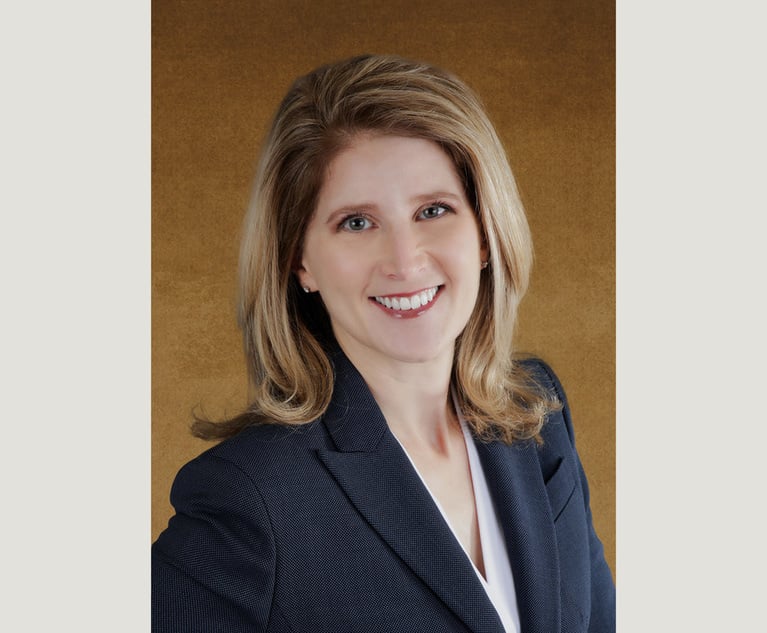Counseling Independent Directors on Reputational Risks and Responsibilities
Attorneys who counsel independent directors on their legal risks and responsibilities sometimes neglect to discuss with their clients their reputational risks, including unknown enterprise risks which, if realized, can damage their reputation.
February 19, 2018 at 12:31 PM
8 minute read

Attorneys who counsel independent directors on their legal risks and responsibilities sometimes neglect to discuss with their clients their reputational risks, including unknown enterprise risks which, if realized, can damage their reputation. Being an independent director of a public company which has suffered a financial disaster can ruin the reputation of even the most diligent and scrupulous independent director. Many independent directors are consultants, retired executives and retired accountants who like the prestige as well as the financial rewards of serving on many boards of directors. Independent directors can easily lose their business reputation as a result of a major scandal in a company in which they have oversight responsibilities.
For example, after the recent sales scandal over fraudulent accounts at Wells Fargo & Co. (Wells Fargo), the Vanguard Group, one of the world's biggest fund managers, voted against the reelection of three directors. Despite that rebuke, Wells Fargo shareholders voted to reelect all the bank's 15 directors. However, some board members edged in just barely. After the vote, the board's chairman said the vote “sent the board a clear message of dissatisfaction.” Based on the report of independent counsel for the independent directors of Wells Fargo, the board was not aware of the fraudulent account risk. On Feb. 2, it was announced that three directors would retire by the 2018 annual meeting.
An older example is the case of Herbert J. Winokor Jr., who was an Enron director and also a member of the governing body of Harvard University. As a result of the Enron scandal and bankruptcy he lost his prestigious position at the Harvard Corp., the governing body of Harvard University.
Counseling an independent director solely on legal risks does not necessarily satisfy all their concerns. Reputational risks which will deprive the independent director of further opportunities and prestige are typically equally important to many directors.
Assuming that the independent director sits on the board of a Delaware corporation, it is typical for the attorney to create a detailed explanation of the director's various fiduciary duties under Delaware law. A comprehensive memorandum is presented to the director by the attorney detailing many of the intricacies of Delaware law. This memorandum may also include an analysis of the director and officer liability insurance policy of the company.
With rare exceptions, directors of public companies do not have to pay money out of their pockets in connection with financial disasters occurring on their watch. Directors are not terribly concerned about shareholder lawsuits because of director and officer liability insurance and broad indemnification provisions in the certificate of incorporation and bylaws of the company. With rare exceptions, directors of public companies do not have to pay money out of their pockets in connection with financial disasters occurring on their watch. A rare exception would be one of the WorldCom directors who reputedly had to pay substantial dollars out of his own pocket.
Many scandals of public companies result from the realization of previously unrecognized enterprise risks. Board members in many cases are not even aware that these enterprise risks actually exist until they are realized.
Directors who are members of audit and risk committees of public company boards who believe that they use current good practices in their deliberations, may be equally surprised that they were not informed of these enterprise risks long before they are realized. These directors may believe that the company's hotline or ethics line, together with the information they receive from top management and the independent and internal auditors, should have warned them of these previously unknown enterprise risks, thereby permitting liability accruals in prior audited financial statements. Unfortunately, most directors do not appreciate the potential deficiencies of each of these information sources to provide warnings of forthcoming financial disasters.
Independent directors who rely on independent auditors to disclose unasserted claims arising out of enterprise risks should be aware of the very limited duties of independent auditors in investigating such risks. Typically this issue is handled by the independent auditors by having top management of the company represent in writing to the independent auditor that they are not aware of unasserted material contingent liabilities and having the company's counsel agree to advise management of any such contingent liabilities. However, top management may not themselves be aware of such unasserted enterprise risks because of silos within the organization (as in the Wells Fargo's case) or because of the reluctance of employees to use hotlines. Even if management knows of possible contingent liabilities they might incorrectly determine that these liabilities are immaterial. Independent auditors currently are not required to check on the effectiveness of these employee hotlines or the employee culture, including the willingness of employees to use hotlines to report enterprise risk.
The 2014 report of Anton Valukas on General Motors (GM) provides ample evidence of how corporate governance can fail despite the use by a board of directors of current good corporate governance practices. The Valukas Report concluded that the GM board of directors was not informed of any problem caused by the Chevrolet Cobalt ignition switch until February 2014. (p. 244) even though there was internal knowledge of these defects for more than seven years among GM employees. General Motors was allegedly responsible for at least 124 deaths and 274 injuries because of faulty ignition switches in their vehicles which prevented the deployment of airbags.
The report indicated that the audit committee of the GM board of directors had general oversight responsible for risk management. According to the report, the audit committee met regularly with the GM chief risk officer (p. 243). With one minor exception, “no specific vehicle safety was brought to the audit committee's attention.” (p. 244)
According to the Valukas Report, in 2007 a Wisconsin state trooper published an accident reconstruction report on a Chevrolet Colbalt fatality in which the airbags did not deploy. The trooper pointed out that the ignition switch appeared to be in the accessory position; that GM had issued a bulletin to dealers warning that low torque could lead to inadvertent turning of the ignition switch, which bulletin he found on the NHTSA website; and that airbags would not deploy when the ignition switch was turned to the accessory position. According to the Valukas Report, no GM employee ever brought this report to the attention of the GM board due in part to silos within the organization and GM's culture which did not encourage whistleblowers.
During the first calendar quarter of 2014, GM informed NHTSA of the vehicle defects and recorded charges of approximately $1.3 billion (exclusive of legal costs) to its operating income to reflect an operating loss of $535 million for the first quarter of 2014. The stock price fell 17 percent during the first quarter of 2014. Audited financial statements issued during 2013 and prior periods were not adjusted even though these contingent liabilities were arguably known for many years and should have reflected an accrual for these known contingent liabilities in prior financial statements.
Most directors of public companies focus on the tone at the top of the organization. However, these same directors do not necessarily know whether that “tone” reaches throughout the organization and may fail to assess the culture of the organization.
Independent directors cannot adequately perform their oversight role without receiving enterprise risk information from lower-level employees. This requires the independent directors to fully understand the culture of the organization and the impediments to a free flow of information to them. Lower-level employees will typically not be willing to risk retaliation for supplying that information to the board unless there is some meaningful monetary company reward, and possibly recognition, for assuming the retaliation risk. Until public companies create incentives to bring legitimate employee whistleblower complaints directly to the attention of the independent directors, corporate governance will continue to fail and public shareholders will continue to wonder whether independent directors are performing adequate management oversight.
Frederick D. Lipman is a senior partner at the law office of Blank Rome. He is the author of 4 books on corporate governance and is the president of the Association of Audit Committee Members, Inc., a non-profit organization with approximately 500 members, devoted to developing best practices for audit committees.
This content has been archived. It is available through our partners, LexisNexis® and Bloomberg Law.
To view this content, please continue to their sites.
Not a Lexis Subscriber?
Subscribe Now
Not a Bloomberg Law Subscriber?
Subscribe Now
NOT FOR REPRINT
© 2025 ALM Global, LLC, All Rights Reserved. Request academic re-use from www.copyright.com. All other uses, submit a request to [email protected]. For more information visit Asset & Logo Licensing.
You Might Like
View All
Pa. Supreme Court to Decide Enforceability of 'Browsewrap' Arbitration Agreements
8 minute read
From a Mediator’s Perspective: Common Mis-steps That Parties Make at Mediation
6 minute readTrending Stories
Who Got The Work
J. Brugh Lower of Gibbons has entered an appearance for industrial equipment supplier Devco Corporation in a pending trademark infringement lawsuit. The suit, accusing the defendant of selling knock-off Graco products, was filed Dec. 18 in New Jersey District Court by Rivkin Radler on behalf of Graco Inc. and Graco Minnesota. The case, assigned to U.S. District Judge Zahid N. Quraishi, is 3:24-cv-11294, Graco Inc. et al v. Devco Corporation.
Who Got The Work
Rebecca Maller-Stein and Kent A. Yalowitz of Arnold & Porter Kaye Scholer have entered their appearances for Hanaco Venture Capital and its executives, Lior Prosor and David Frankel, in a pending securities lawsuit. The action, filed on Dec. 24 in New York Southern District Court by Zell, Aron & Co. on behalf of Goldeneye Advisors, accuses the defendants of negligently and fraudulently managing the plaintiff's $1 million investment. The case, assigned to U.S. District Judge Vernon S. Broderick, is 1:24-cv-09918, Goldeneye Advisors, LLC v. Hanaco Venture Capital, Ltd. et al.
Who Got The Work
Attorneys from A&O Shearman has stepped in as defense counsel for Toronto-Dominion Bank and other defendants in a pending securities class action. The suit, filed Dec. 11 in New York Southern District Court by Bleichmar Fonti & Auld, accuses the defendants of concealing the bank's 'pervasive' deficiencies in regards to its compliance with the Bank Secrecy Act and the quality of its anti-money laundering controls. The case, assigned to U.S. District Judge Arun Subramanian, is 1:24-cv-09445, Gonzalez v. The Toronto-Dominion Bank et al.
Who Got The Work
Crown Castle International, a Pennsylvania company providing shared communications infrastructure, has turned to Luke D. Wolf of Gordon Rees Scully Mansukhani to fend off a pending breach-of-contract lawsuit. The court action, filed Nov. 25 in Michigan Eastern District Court by Hooper Hathaway PC on behalf of The Town Residences LLC, accuses Crown Castle of failing to transfer approximately $30,000 in utility payments from T-Mobile in breach of a roof-top lease and assignment agreement. The case, assigned to U.S. District Judge Susan K. Declercq, is 2:24-cv-13131, The Town Residences LLC v. T-Mobile US, Inc. et al.
Who Got The Work
Wilfred P. Coronato and Daniel M. Schwartz of McCarter & English have stepped in as defense counsel to Electrolux Home Products Inc. in a pending product liability lawsuit. The court action, filed Nov. 26 in New York Eastern District Court by Poulos Lopiccolo PC and Nagel Rice LLP on behalf of David Stern, alleges that the defendant's refrigerators’ drawers and shelving repeatedly break and fall apart within months after purchase. The case, assigned to U.S. District Judge Joan M. Azrack, is 2:24-cv-08204, Stern v. Electrolux Home Products, Inc.
Featured Firms
Law Offices of Gary Martin Hays & Associates, P.C.
(470) 294-1674
Law Offices of Mark E. Salomone
(857) 444-6468
Smith & Hassler
(713) 739-1250







